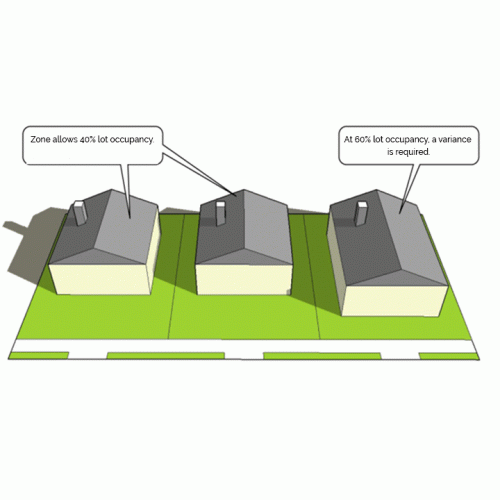
A variance is a way that an LGU may allow an exception to provisions of a zoning ordinance. A variance is a way to obtain clear permission from the LGU to depart from strict enforcement of the ordinance on an isolated and one time basis. The typical variance application for a lake property is to obtain a more favorable setback restriction, either from the lake, the right of way, or the neighboring lot line. A variance could be sought for a great number of reasons such as an increased building envelope, increased impervious surface allowance, greater height allowance, and so on.
The process of obtaining a variance can vary depending on the LGU, but typically applications are first considered by the local “Board of Adjustment” or a planning commission or sometimes directly to the Township Board or City Council. A variance can usually be appealed either to the Council or to the local District Court, depending on the particular zoning ordinance.
In order to successfully obtain a variance, an applicant must be able to prove that not providing the variance would cause practical difficulties for the landowner. Minnesota has a three factor test for the LGU to consider in the decision to grant or deny a variance. All three factors must be met by the landowner to have the application approved. Additionally, the LGU must be able to state that the variance sought would be in harmony with the general purposes of the zoning ordinance (usually this means the variance is in line with the comprehensive plan). Without going too in depth, the three aforementioned factors include, (1) the landowner proposes to use the property in a reasonable manner (this is somewhat of a judgment call for the LGU as to whether it might make sense to allow the subject property to have a less restrictive setback from the lake or the lot line, for example), (2) the landowner’s difficulty in complying with the zoning ordinance is due to circumstances unique to the property not caused by the landowner (for example, the topography of the land has certain limitations that may require a variance for placement of a septic mound), and (3) a granted variance cannot alter the essential character of the locality (for example, if all the homes in the locality or no more than two stories it may not make sense to allow a three or four story home that would stick out or alter the character of the neighborhood).
The consideration of whether to grant or deny a variance is public. Usually nearby landowners receive notice of an application as an opportunity to provide feedback. Although, as effective as it may be on some LGU councils/boards, neighbor feedback (positive or negative) is not a factor to approving or denying a variance. Economic or personal concerns are also not factors. Many applicants without legal representation labor on the economic hardship that would be imposed if the variance sought is not requested. As much sense as that may make, it is not a factor that the governing body should consider. Some applicants also labor over personal concerns such as handicap access or related needs. Notice too that those are not relevant factors for the governing body to consider. Although it is counterintuitive, neighbor feedback, economic and personal concerns are not factors in proving practical difficulties. That fact can be difficult for many applicants to understand.
Regardless of whether a variance is granted or denied, the findings supporting the decision are usually prepared in advance of the public hearing. For that reason, it is essential to have a complete variance application and to not save any arguments for the hearing.
Notwithstanding the earlier comments regarding the technical irrelevance of economic concerns, on a pragmatic level, if a variance is granted it can significantly improve the value of the property. It may be prudent, then, to invest in sound legal representation to properly apply for a variance. The decision to have professional guidance in the variance process should be made at the very beginning of the process because, if denied by the LGU, a record is being built for appeal. If the record is complete with reasons to support all three practical difficulty factors it may be possible to reverse the decision on appeal. However, the bar is quite high to successfully reverse the initial decision to deny a variance.
Knowing the process to grant or deny a variance is beneficial to those that object to a variance application as well. As real estate law firm, it is not uncommon to represent applicants and objectors. Most of the time the local governing board wants to make “the right decision” that invites the least conflict. If an application is prepared with these things in mind the chance of that application being granted increases. If an opposing position is prepared with these things in mind, the chance of that application being granted can decrease.
If you as a landowner or interested party could ever be impacted by a variance do not be afraid to discuss the issue with the local zoning administrator or a local real estate attorney.
MSBA Certified Real Property Law Specialist
Severson Porter Law
mark@seversonporter.com
